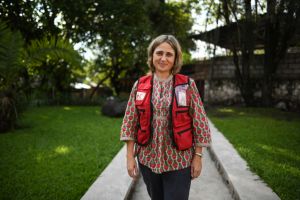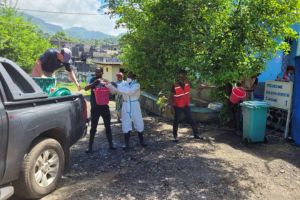The Canadian Red Cross has a long and proud history of women involved in its humanitarian services, with more than 100 years of providing help and hope. Today, women still play a vital role in the Red Cross Red Crescent Movement, in Canada and around the world. To commemorate International Women’s Day, we want to celebrate an example of two women working, learning, and leading together.
On February 2, 2024, a cholera epidemic was declared the Comoro Islands (Comoros), a small country made up of three islands in the Indian Ocean off the coast of East Africa. Cholera is an infectious disease caused by bacteria and is spread through contaminated water sources or food.
How Peer Support and Mentorship Strengthen Humanitarian Efforts
Thanks to support from the Government of Canada, the Canadian Red Cross was able to send five humanitarian experts with a variety of specialities to support and work alongside the Comoros Red Crescent’s overall cholera response. One of these experts, Maria Muñoz-Bertrand, was able to offer mentoring support to Irina, a fellow doctor working with the Comoros Red Crescent, by offering peer support, guidance, and sharing experiences.
Photo credit: Corrie Butler / IFRC
Maria’s background is in medicine, public health and hygiene, and she has many years of experience working with different Red Cross and Red Crescent Societies throughout Africa and the Caribbean. She connected with Irina in Comoros to support response efforts, which included engaging with the community on limiting the spread of cholera and monitoring cases, as well as training.
Female Leaders Making an Impact in the Cholera Epidemic Response
Irina joined the Comoros Red Crescent because she wanted to help people both inside and outside of a hospital. As a medical doctor, she recognized how important it is to get involved at a community level to help educate and prevent illnesses, rather than just treating them. It’s because of dedicated people like Irina that the Comoros Red Crescent is nationally recognized for their experience and played a central role in the cholera epidemic response.“[Irina] is lovely and she's good at what she does,” Maria explained. “I am at the point where I am super happy to support other people to reach their goals. She’s an asset for her National Society. She's an asset for the region. It brings me joy to know that.”

Photo credit: Canadian Red Cross
As the cholera situation in Comoros improved and Maria returned home to Canada, she maintained her connection with Irina with continued guidance and mentorship support. Later in 2024, both Maria and Irina found themselves supporting different aspects of the mpox emergency response throughout Africa. As Irina embarked on her first mission with the International Federation of Red Cross and Red Crescent Societies, Maria was there to help answer questions and support her along the way.
“She advised me on how to live in a country that is different from my own. She helped me with everything, right down to clothing,” Irina reflected. “I can't mention everything she's done for me, but I can say that without her advice throughout the whole process of moving from Comoros, I'd be completely lost.”
Why Collaboration is Key in Humanitarian Efforts
As part of a commitment to empowering the local capacities of Red Cross and Red Crescent National Societies around the world, many Canadian Red Cross experts like Maria act as mentors to share their knowledge and expertise so it can be used to build local capacity for future events. These connections are often maintained long after an emergency response has concluded, so when a disaster strikes, local staff and volunteers are more prepared to respond and provide aid.“I think one of the strengths of the Red Cross Movement is that you meet all sorts of inspiring people, and you create those links,” says Maria. “It's not all the time that you can support, but when it's possible, it's wonderful.”
Thank you to the Government of Canada for supporting both Maria and Irina’s work on the mpox emergency response. With this funding, the Canadian Red Cross is able to support local humanitarian experts as they respond to emergencies in their region, as well as sending international humanitarian experts when they are needed.

